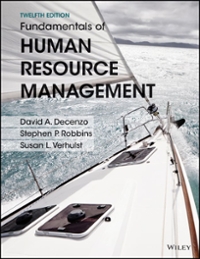Next time you go through security on your way through the airport, smile and say thank you
Question:
Next time you go through security on your way through the airport, smile and say thank you to the screeners who help you send your bags through screening and wave you through the scanner. Low morale runs rampant through the screeners that work at the Transportation Security Administration (TSA), and odds are that the screener you smile at is thinking about quitting.
A recent government report revealed concerns that the low morale of the screeners may be a distraction to them on the job and may even cause them to be less focused on security and screening responsibilities. About one in five of the nation’s 45,000 screeners quit every year due to low morale, low pay, discrimination, and fear of retaliation if they complain. Further complicating the morale problems are the “enhanced” pat down procedures added to screener’s job responsibilities in 2010. Screeners report being called “molester, pervert, creep” and much worse by passengers who are understandably upset by being subjected to the pat downs after setting off metal detectors in some airports.
TSA employees had a long list of issues they believed contributed to the low morale and turnover including the TSA’s pay‐for‐performance system, called Performance Accountability and Standards System (PASS), which was widely viewed by employees as unfair and discriminatory to older workers, minorities, and women. In an effort to gain more control over working conditions, TSA employees voted to allow the American Federation of Government Employees (AFGE) to represent them as a union in 2011.31 In 2012, the AFGE negotiated a collective bargaining agreement designed to correct the working conditions that TSA employees found objectionable. Terms of the agreement include the following:
• Replacing PASS with a performance appraisal process that puts increased emphasis on evaluating officer’s performance based on supervisor observations rather than certification test scores.
• Awards for attendance, outstanding service, leadership, and performance. Additional awards may be established at individual airports based on their needs and challenges.
• Changes in attendance policies, guidelines for tardiness, and the process for approval of sick leave.
• Revision of how employees bid for shifts, annual leaves, transfer policies, and how employees may convert from part‐time to full‐time.
• Changes in requirements for uniforms, personal appearance, and subsidies for uniforms and parking.
• Requirements for personal safety and comfort including workplace temperatures, lighting, ergonomic equipment, and noise levels.
• Revised dispute resolution process designed to provide fairness and due process for TSA officers including a revised appeal process for disciplinary actions.
Kim Kraynak‐Lambert of the AFGE was happy with the agreement, stating “TSOs (Transportation Safety Officers) come to work every day in the face of intense public and congressional scrutiny and, to the best of their ability, protect this nation from terrorist attack. Now we can look forward to new rights and new working conditions, and a chance to form a true labor‐ management partnership.”
Questions:
1. How do elements of the collective bargaining agreement address job enrichment issues? In what ways might they influence morale and retention?
2. Choose a job analysis method or combination of methods to begin the process to redesign the TSA officer job descriptions. Why would this be the most appropriate method(s) to analyze the positions?
3. How can well‐designed jobs reduce the attractiveness of union representation for employees?
4. Research: What is the current status of AFGE and the TSA? Has the TSA added elements of job enrichment to the TSO positions? Will the issues they are currently negotiating lead to job satisfaction?
Step by Step Answer:

Fundamentals Of Human Resource Management
ISBN: 9781119032748
12th Edition
Authors: David A DeCenzo, Stephen P Robbins, Susan L Verhulst





